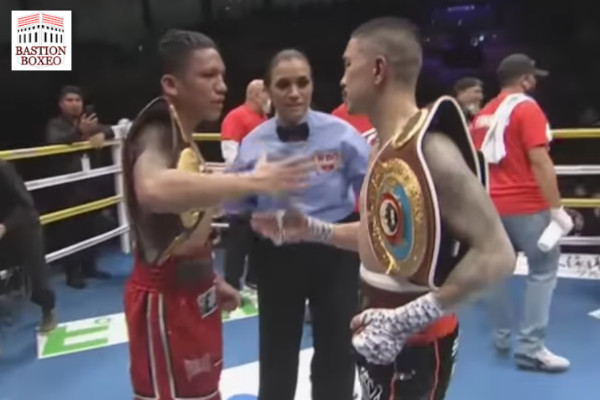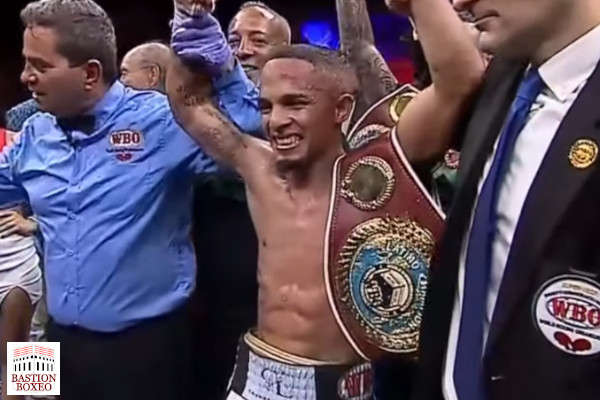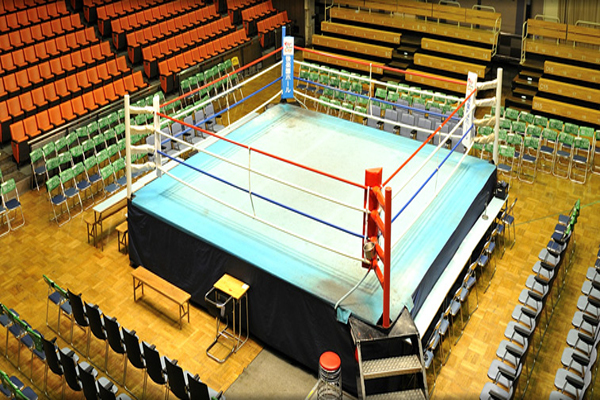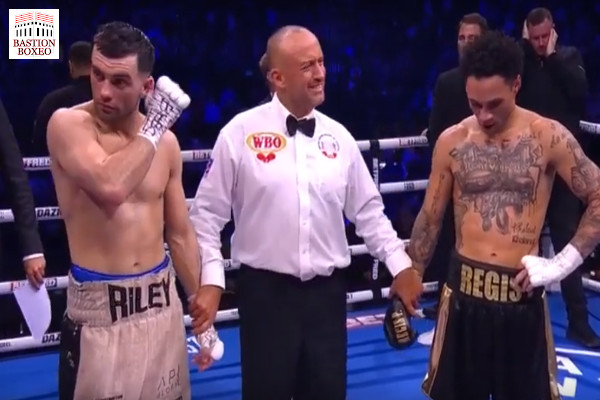Kazuto Ioka y Joshua Franco empataron en unificación del peso supermosca
Daniel Pi
@BastionBoxeo
Ota-City General Gymnasium, Tokio, Japón. Unificación de los cinturones mundiales WBA y WBO del peso supermosca.
Por lo general se considera que un empate fuera de casa es simplemente una victoria que los jueces locales no quisieron reconocer, algo que es cierto en muchos casos. Sin embargo, no fue así en la pelea de unificación entre el japonés Kazuto Ioka 29(15KO)-2-1 y el estadounidense Joshua “El Profesor” Franco 18(8KO)-1(1)-3, ya que, pese a que muchos clamaron contra el veredicto, el resultado final de empate es perfectamente justificable, como lo habría sido también la victoria por un asalto de cualquiera de los dos boxeadores. Las puntuaciones fueron de 114-114, 114-114 y un 115-113.
Las cosas no empezaron nada mal para Ioka, que en el primer round usó el jab mejor que su oponente y se apoyó en su buena selección de golpes y en su precisión para llegar con manos claras mientras utilizaba sutiles acciones defensivas. Sin embargo, pronto Franco empezó a desplegar combinaciones de gancho zurdo directo diestro que amenazaron con superar por potencia y frecuencia el trabajo de Ioka, que tan pronto como en el segundo asalto tuvo que recurrir al clinch.
Aun así, el japonés, que tiene mucha veteranía y mucha astucia, supo cómo dar réplica para, pese a lanzar menos golpes, mantener las acciones contendidas y ganar no pocos asaltos de la primera mitad gracias a su claridad de golpeo y a su control de los tiempos y de los espacios.
Si bien la pelea no estaba siendo desfavorable para Ioka inicialmente, podía terminar siéndolo si no conseguía ofrecer regularmente contraofensivas cuando estaba cerca de las cuerdas y permitía que Franco siguiendo haciendo la pelea notablemente física. Con todo, en momentos como en el cuarto asalto, el local incluso se paró a intercambiar en corta prolongadamente, decisión que favoreció a un Franco que sólo tenía ventaja sobre él en resistencia al cansancio y al castigo y en volumen de puños.
Así, gradualmente, a la vez que Ioka iba teniendo menos energías y menos firmeza en su respuesta, Franco fue insistiendo crecientemente en sus ofensivas, que cada vez situaron más veces y durante más tiempo a su rival cerca de las cuerdas. En el séptimo round “El Profesor” descargó ya duras combinaciones gancho-directo que sacudieron repetidamente la cabeza de su contrincante. De todos modos, en el octavo y el noveno, Ioka todavía pudo tirar series certeras y oportunistas que le permitieron mantener a raya un tanto a su oponente y lograr un margen vital de cara al final.
Y es que en los dos últimos rounds Franco puso a su oponente en serios apuros. Primeramente, en el undécimo asalto Ioka fue movido por las combinaciones de su contrincante y pareció desgastado, mientras que posteriormente, en el último episodio, fue dañado por los ganchos zurdos del estadounidense, golpes que aun así resistió y contestó evitando males mayores para sus intereses.
Dado que Franco tuvo una buena segunda mitad, un gran final y una superior cadencia de golpes, fue lógico que muchos considerasen que el visitante había merecido más que un empate. Con todo, es justo señalar que Franco tuvo una muy deficiente ejecución de golpeo durante gran parte de la pugna, especialmente en la primera mitad y que erró una gran cantidad de puños, algo que se pudo ver a simple vista.
En este sentido, aunque las estadísticas de CompuBox siempre son cuestionables y a menudo son muy sesgadas, es necesario destacar que, según esta empresa, Franco conectó 15 de 128 golpes en el tercer round y que en total impactó 202 puños de 1412 lanzados, cifras absolutamente horrendas que muestran, una de dos, o las enormes brechas del púgil o la nefasta eficacia de Compubox.
En cualquier caso, contrastando durante buena parte de la pelea los mal ejecutados puños y la imprecisión de Franco con los afilados puños de Ioka, su inteligente gestión táctica y su capacidad para dar respuesta de manera oportunista cuando era necesario, puntuando asalto por asalto el empate no pareció ni mucho menos fuera de lo razonable a pesar de que el japonés volvió a dosificar mal sus energías y tomó riesgos innecesarios.
Con el empate, tanto Franco como Ioka podrán buscar nuevas pugnas con las que intentar mejorar sus prestigios y en las que serán otros quienes podrán tratar de explotar los defectos de estos dos púgiles, que posiblemente sumarán una clara derrota en cuanto se encuentren con un boxeador de élite que pueda ofrecer un planteamiento estratégico consistente durante los doce asaltos.

Kazuto Ioka and Joshua Franco fought to a draw in super flyweight unification
Daniel Pi
@BastionBoxing
Ota-City General Gymnasium, Tokyo, Japan. Unification of the WBA and WBO world super flyweight belts.
Usually a draw as a visitor is simply considered a victory that the local judges did not want to recognize, something that is true in many cases. However, this was not the case in the unification fight between the Japanese Kazuto Ioka 29(15KO)-2-1 and the American Joshua «El Profesor» Franco 18(8KO)-1(1)-3, since, although many claimed the verdict was a robbery, the final result of draw was perfectly justifiable as would have been as well the victory of either boxer by one round margin. The scores were 114-114, 114-114 and 115-113.
Things didn’t start badly for Ioka, who in the first round used the jab better than his opponent and relied on his good punch selection and precision to land clear hands while using subtle defensive actions. Soon, however, Franco began throwing right hand-left hook combinations that threatened to outpower and outwork Ioka, who as early as the second round had to resort to the clinch.
Even so, the Japanese, who has a lot of experience and a lot of cunning, knew how to reply to, despite throwing fewer blows, keep the actions contested and win many rounds in the first half thanks to his striking clearness and his timing and control of distance.
While Ioka was having success initially, things could end up changing if he didn’t launch regular counteroffensives when he was near the ropes and allowed Franco to keep making the fight remarkably physical. However, at moments such as the fourth round, the local even stopped his feet to exchange at close range, a decision that favored Franco, who only had an advantage over him in resistance to fatigue and punishment and in the punch output.
Thus, gradually, Ioka was having less energy and less firmness in his response while Franco increasingly insisted on his attacks, which each time placed his opponent near the ropes more and for longer periods. In the seventh round, «El Profesor» unleashed hard straight-hook combinations that repeatedly shook his opponent’s head. However, in the eighth and ninth, Ioka was still able to connect accurate and opportunistic combinations that allowed him to hold off his opponent for a bit and achieve a vital margin going into the end.
In the last two rounds Franco put the Japanese in serious trouble. Firstly, in the eleventh round, Ioka was rocked by his opponent’s combinations and seemed worn out, while later, in the last round, he was hurt by the American’s left hooks, shots that he resisted and answered, avoiding greater danger.
Given that Franco had a good second half, a great finish and a higher punch rate, it was logical that many considered that the visitor had deserved more than a draw. All in all, it is fair to point out that Franco had a very poor punching technique for much of the bout, especially in the first half, and that he missed a large number of punches, something that could easily be seen.
In this sense, although CompuBox’s statistics are always questionable and are often very biased, it is necessary to point out that, according to this company, Franco landed 15 of 128 punches in the third round and that in total he connected 202 punches out of 1,412 thrown, absolutely horrendous numbers that either show the huge flaws of the boxer or the awful efficiency of Compubox.
In any case, contrasting for good part of the fight the poor technique of Franco’s punches and his imprecision with Ioka’s sharp shots, his intelligent tactical management and his ability to respond opportunistically when necessary, scoring the fight round by round, the draw did not seem unreasonable despite the fact that the Japanese once again mismanaged his energies and took unnecessary risks.
With the draw, both Franco and Ioka will be able to look for new fights with which to try to improve their prestige and in which it will be others who will be able to try to exploit the flaws of these two fighters, who will possibly suffer a clear defeat as soon as they battle an elite boxer who can offer a consistent strategic approach throughout the twelve rounds.










